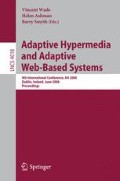Abstract
We propose an associative mechanism for adaptive generation of problems in intelligent tutors. Our evaluations of the tutors that use associative adaptation for problem sequencing show that 1) associative adaptation targets concepts less well understood by students; and 2) associative adaptation helps students learn with fewer practice problems. Apart from being domain-independent, the advantages of associative adaptation compared to other adaptive techniques are that it is easier to build and is scalable.
Access this chapter
Tax calculation will be finalised at checkout
Purchases are for personal use only
Preview
Unable to display preview. Download preview PDF.
References
Aimeur, E., Brassard, G., Dufort, H., Gambs, S.: CLARISSE: A Machine Learning Tool to Initialize Student Models. In: Cerri, S., Gouarderes, G., Paraguacu, F. (eds.) Proc. of ITS 2002, pp. 718–728. Springer, Heidelberg (2002)
Arroyo, I., Conejo, R., Guzman, E., Woolf, B.P.: An Adaptive Web-Based Component for Cognitive Ability Estimation. In: Proc. of AIED 2001, pp. 456–466. IOS Press, Amsterdam (2001)
Bloom, B.S., Krathwohl, D.R.: Taxonomy of Educational Objectives: The Classification of Educational Goals. In: Handbook I: Cognitive Domain, New York, Longmans, Green (1956)
Bloom, B.S.: The 2 Sigma Problem: The Search for Methods of Group Instruction as Effective as One-to-One Tutoring. Educational Researcher 13, 3–16 (1984)
Brown, J.S., Burton, R.R.: Diagnostic models for procedural bugs in basic mathematical skills. Cognitive Science 2, 155–191 (1978)
Czarkowski, M., Kay, J.: Challenges of Scrutable Adaptivity. In: Hoppe, U., Verdejo, F., Kay, J. (eds.) Proc. of AIED 2003, pp. 404–406. IOS Press, Amsterdam (2003)
Dancik, G., Kumar, A.N.: A Tutor for Counter-Controlled Loop Concepts and Its Evaluation. In: Proceedings of Frontiers in Education Conference (FIE 2003), Boulder, CO, 11/5-8/2003, Session T3C (2003)
Kay, J.: Stereotypes, Student Models and Scrutability. In: Gauthier, G., VanLehn, K., Frasson, C. (eds.) ITS 2000. LNCS, vol. 1839, pp. 19–30. Springer, Heidelberg (2000)
Kalyuga, S.: Rapid Assessment of Learner’s Knowledge in Adaptive Learning Environments. In: Proc. of AIED 2003, pp. 167–174. IOS Press, Amsterdam (2003)
Kurhila, J., Lattu, M., Pietilä, A.: Using Vector-Space Model in Adaptive Hypermedia for Learning. In: Cerri, S.A., Gouardéres, G., Paraguaçu, F. (eds.) ITS 2002. LNCS, vol. 2363, pp. 129–138. Springer, Heidelberg (2002)
Kumar, A.N.: Using Enhanced Concept Map for Student Modeling in a Model-Based Programming Tutor. In: International FLAIRS conference on Artificial Intelligence, Melbourne Beach, FL, May 11-13 (2006)
Kumar, A.N.: Explanation of step-by-step execution as feedback for problems on program analysis, and its generation in model-based problem-solving tutors, Technology, Instruction, Cognition and Learning (TICL) Journal (to appear)
Martin, B., Mitrovic, A.: Tailoring Feedback by Correcting Student Answers. In: Gauthier, G., VanLehn, K., Frasson, C. (eds.) ITS 2000. LNCS, vol. 1839, pp. 383–392. Springer, Heidelberg (2000)
Melis, E., Andres, E., Budenbender, J., Frischauf, A., Goguadze, G., Libbrecht, P., Pollet, M., Ullrich, C.: ActiveMath: A Generic and Adaptive Web-Based Learning Environment. International Journal of Artificial Intelligence in Education 12, 385–407 (2001)
Pérez-de-la-Cruz, J.-L., Millán, E., Suarez, E.: Adaptive Bayesian Networks for Multilevel Student Modelling. In: Gauthier, G., VanLehn, K., Frasson, C. (eds.) ITS 2000. LNCS, vol. 1839, pp. 534–543. Springer, Heidelberg (2000)
Reiser, B., Anderson, J., Farrell, R.: Dynamic student modelling in an intelligent tutor for LISP programming. In: Proc. of IJCAI 1985, Los Altos (1985)
Salton, G., Wong, A., Yang, C.S.: A Vector Space Model for Automatic Indexing. Communications of the ACM 18(11), 613–620 (1975)
Weber, G., Brusilovsky, P.: ELM-ART: An Adaptive Versatile System for Web-Based Instruction. International Journal of Artificial Intelligence in Education 12, 351–384 (2001)
Wainer, H.: Computerized Adaptive Testing: A Primer. Lawrence Erlbaum Associates, Hillsdale (1990)
Author information
Authors and Affiliations
Editor information
Editors and Affiliations
Rights and permissions
Copyright information
© 2006 Springer-Verlag Berlin Heidelberg
About this paper
Cite this paper
Kumar, A. (2006). A Scalable Solution for Adaptive Problem Sequencing and Its Evaluation. In: Wade, V.P., Ashman, H., Smyth, B. (eds) Adaptive Hypermedia and Adaptive Web-Based Systems. AH 2006. Lecture Notes in Computer Science, vol 4018. Springer, Berlin, Heidelberg. https://doi.org/10.1007/11768012_18
Download citation
DOI: https://doi.org/10.1007/11768012_18
Publisher Name: Springer, Berlin, Heidelberg
Print ISBN: 978-3-540-34696-8
Online ISBN: 978-3-540-34697-5
eBook Packages: Computer ScienceComputer Science (R0)

